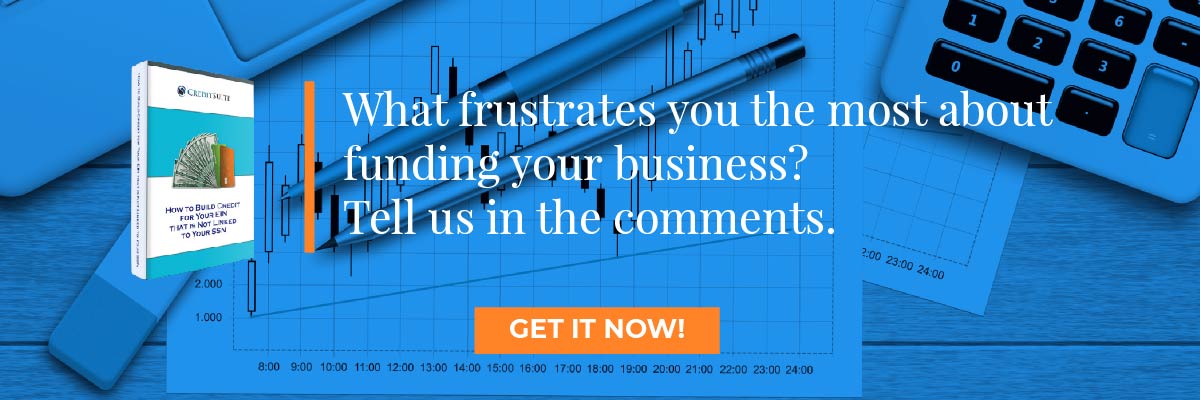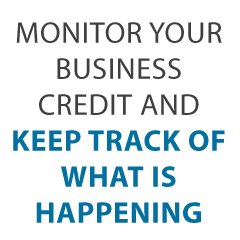- Connect With Us!
- (877) 600-2487
- info@creditsuite.com
Business Credit Monitoring 101
Published By Janet Gershen-Siegel at December 3rd, 2017
Class is in Session! It’s Time for Business Credit Monitoring 101!
Monitoring business credit starts with requesting your small business’s credit reports. Do you know the way to conveniently request and review your company credit reports? Welcome to Business Credit Monitoring 101.
Does your company have an epic company credit score? Or it is any good at all?
So you are presently in business, and you are working hard to keep on top of your commercial credit scores.
Or perhaps you are not, and have decided now is a good time to start. Or perhaps your small business is reasonably new, and this is the first time you’re doing this.
No matter what your circumstance, you have most likely asked this question at least once. Are my credit scores any good?
Let’s take a look at the three business credit reporting agencies. And we’ll solve this mystery at long last.
Business Credit Monitoring 101: Your Business’s Experian Company Credit Score
Experian’s Credit Score report includes a business credit score as well as other facts, including account histories, payment trends, and public records. Experian company credit scores range from 1 to 100.
In contrast to Dun & Bradstreet’s PAYDEX score and Equifax’s payment index, Experian takes into consideration several factors, and not simply payment histories.
Business Credit Monitoring 101: Experian
Experian, another big credit reporting company, also provides a method for receiving reports sent to you for a cost. Thus you can keep track of your Experian business credit score and the setup is effortless. Having said that, if you would rather not get continuing reports (and purchase them), then you can order a separate Experian report for your firm on their web site. Also, if there are any problems or errors, you can dispute any problems on your business’s Experian report if you follow the instructions on their web site. Learn about reading through your Experian report by evaluating a sampling Experian business credit report.
Experian Scoring Factors
The variables that go into the calculation include:
- Lines of credit your company has an application for in the last nine months
- New lines of credit you’ve begun in the prior six months
- Your business’s years in business
- Payment history in the previous twelve months
More Experian Scoring Factors
- Lines of credit in use in the prior six months
- Collections totals in the past seven years
- Percent of available credit in use
- Amount of payments one – 30 days late, or 31 days or more late
- Number of non-net-30 lines of credit (that means the payment is due in fewer or more than 30 days).
Typically, even companies that use credit responsibly will get a medium-low risk rating. As you might expect, older businesses will have a much easier time attaining a low-risk rating.
An awesome Experian score for your small business is 76-100.
Business Credit Monitoring 101: Your Company’s PAYDEX Score
Dun & Bradstreet’s PAYDEX score runs from 0 to 100. A PAYDEX score has a basis in payment details which is on report to the agency. Or it is on report to data-gathering businesses partnering with the CRA.
D & B uses this information, along with a credit score and financial stress score, so as to recommend just how much credit a lender should extend to your company.
Find out why so many companies are using our proven methods to improve their business credit scores.
Business Credit Monitoring 101: PAYDEX
Dun & Bradstreet’s PAYDEX score of your business can wind up being one of the primary reasons that your company obtains credit in any way. D & B furnishes Credit Signal, which is a means to monitor your credit score by having the reports come immediately to you, for a cost. You may discover the expense is well worth it in order to avoid the nuisances that can originate from letting this score slip, and to not need to produce and handle the organizing and reminders you might need to stay up to date with if you don’t use it.
Don’t wish to utilize Credit Signal? Don’t worry, as you can acquire your PAYDEX report via D & B and, if necessary, you can connect with their Customer Service department (this department exists as a part of Dun & Bradstreet itself). Additionally, in order to review your PAYDEX report, check out what D & B provides, which is a sample report and also some higher level suggestions in exactly how to interpret it.
Getting a PAYDEX Score
To generate a PAYDEX number, you must file for a D-U-N-S number by means of Dun & Bradstreet’s website. The number is free. Plus the CRA will need to have reports of your payments with four or more vendors.
Your small business’s PAYDEX score indicates if your payments are commonly made on schedule or ahead of schedule. As you might expect, a higher number is better.
PAYDEX Score Details
The scores work out as follows:
- 80-100: A low risk of late payments
- 50-79: A medium risk of late payments
- 49: A high risk of late payments
Business Credit Score
Your business’s credit score runs from 1 to 5. 1 is the very best score. This matches your business with other businesses with similar payment histories. The number reveals how frequently those businesses tend to pay on time.
This data can really help lenders to understand your company’s standing.
But it does not truly reflect all of the payment records from your company.
Financial Stress Score
The financial stress score also runs from 1 to 5. This score matches your business with other businesses sharing comparable financial and business characteristics.
These similarities are in areas like size or amount of time in business. This score demonstrates how often those comparable businesses tend to pay on time. As before, 1 is the best score. This rating is a more comprehensive look at the business landscape, versus an analysis of your small business’s actual payment history.
An awesome PAYDEX score for your small business is 80-100.
Business Credit Monitoring 101: Your Business’s Equifax Score
Equifax displays three distinct business determinations on its commercial credit reports. These are the Equifax payment index, your small business’s credit risk score, and its business failure score.
Business Credit Monitoring 101: Equifax
Equifax, one of the big credit reporting firms, supplies a risk monitoring service which is more convenient as it allows for reports to come directly to you. If you don’t want to pay for ongoing reports, you can as an alternative order your small business’s Equifax report. In addition, if you have to question your business’s Equifax report, you can do so by following the directions on their site. You can learn how to go over your Equifax report by checking out a specimen of their reports.
Equifax Payment Index
Similar to the PAYDEX score, Equifax’s payment index, which has its measurement on a scale of 100, shows how many of your company’s payments were made in a timely manner. These include both information from credit issuers and vendors.
But it’s not meant to anticipate future activity. That is what the other two scores are for.
Equifax Credit Risk Score
Equifax’s credit risk score checks how likely it is your business will become severely delinquent on payments. Scores run from 101 to 992, and they determine:
- Available credit limit on revolving credit accounts, e. g. credit cards
- Your company size
- Proof of any non-financial transactions (e. g. merchant invoices) which are delinquent or were on charge off for two or more billing cycles
- Length of time since the opening of the earliest financial account
Find out why so many companies are using our proven methods to improve their business credit scores.
Equifax Business Failure Score
Finally, Equifax’s business failure score looks at the chance of your business closing. It runs from 1,000 to 1,600, reviewing these elements:
- Total balance to total current credit limit average utilization in the previous three months
- The length of time since the opening of the earliest financial account
- Your company’s worst payment status on all trades in the last 24 months.
- Confirmation of any non-financial transactions (e. g. vendor invoices) which are late or have been on charge off for two or more billing cycles.
Equifax Scoring Analysis
For the credit risk and the business failure scores, a rating of 0 means bankruptcy.
A terrific Equifax score for your small business is as follows:
- Payment Index 0-10
- Credit Risk score 892-992
- Business Failure score 1400-1600
Business Credit Monitoring 101: Monitor Your Business Credit
Know what is happening with your credit. Make certain it is being reported and take care of any mistakes ASAP. Get in the habit of taking a look at credit reports and digging into the specifics, and not just the scores.
We can help you monitor business credit at Experian and D&B for 90% less than it would cost you at the CRAs. See: fastcs.wpengine.com/monitoring.
At D&B you can monitor at: www.dandb.com/credit-builder. At Experian, you can monitor your account at: www.smartbusinessreports.com/Landing/1217/. And at Equifax, you can monitor your account at: www.equifax.com/business/business-credit-monitor-small-business. Experian and Equifax cost about $19.99; D&B ranges from $49.99 to $99.99.
Update Your Record
Update the information if there are errors or the relevant information is incomplete. At D&B, you can do this at: https://iupdate.dnb.com/iUpdate/viewiUpdateHome.htm. For Experian, go here: www.experian.com/small-business/business-credit-information.jsp. So for Equifax, go here: www.equifax.com/business/small-business.
Find out why so many companies are using our proven methods to improve their business credit scores.
Business Credit Monitoring 101: Fix Your Business Credit
So, what’s all this monitoring for? It’s to dispute any errors in your records. Errors in your credit report(s) can be fixed. But the CRAs normally want you to dispute in a particular way.
Get your small business’s PAYDEX report at: www.dnb.com/about-us/our-data.html. Get your company’s Experian report at: www.businesscreditfacts.com/pdp.aspx?pg=SearchForm. And get your Equifax business credit report at: www.equifax.com/business/credit-information.
Disputes
Disputing credit report inaccuracies generally means you mail a paper letter with duplicates of any evidence of payment with it. These are documents like receipts and cancelled checks. Never send the originals. Always send copies and retain the original copies.
Fixing credit report inaccuracies also means you specifically detail any charges you dispute. Make your dispute letter as understandable as possible. Be specific about the problems with your report. Use certified mail so that you will have proof that you mailed in your dispute.
Dispute your or your company’s Equifax report by following the instructions here: www.equifax.com/small-business-faqs/#Dispute-FAQs.
You can dispute inaccuracies on your or your small business’s Experian report by following the directions here: www.experian.com/small-business/business-credit-information.jsp.
And D&B’s PAYDEX Customer Service contact number is here: www.dandb.com/glossary/paydex.
A Word about Business Credit Monitoring 101
Always use credit responsibly! Never borrow beyond what you can pay back. Track balances and deadlines for payments. Paying off on schedule and in full will do more to raise business credit scores than almost anything else.
Establishing business credit pays. Excellent business credit scores help a business get loans. Your lending institution knows the business can pay its financial obligations. They know the business is authentic.
The small business’s EIN links to high scores and lending institutions won’t feel the need to demand a personal guarantee.
Business Credit Monitoring 101: Takeaways
Business credit is an asset which can help your small business for years to come. Learn more here and get started toward growing small business credit.

 " class="attachment-blog-single size-blog-single wp-post-image" alt="Get Business Credit Cards for New Businesses Credit Suite-Business Line of Credit Decoded" title="Get Business Credit Cards for New Businesses">>
" class="attachment-blog-single size-blog-single wp-post-image" alt="Get Business Credit Cards for New Businesses Credit Suite-Business Line of Credit Decoded" title="Get Business Credit Cards for New Businesses">>
